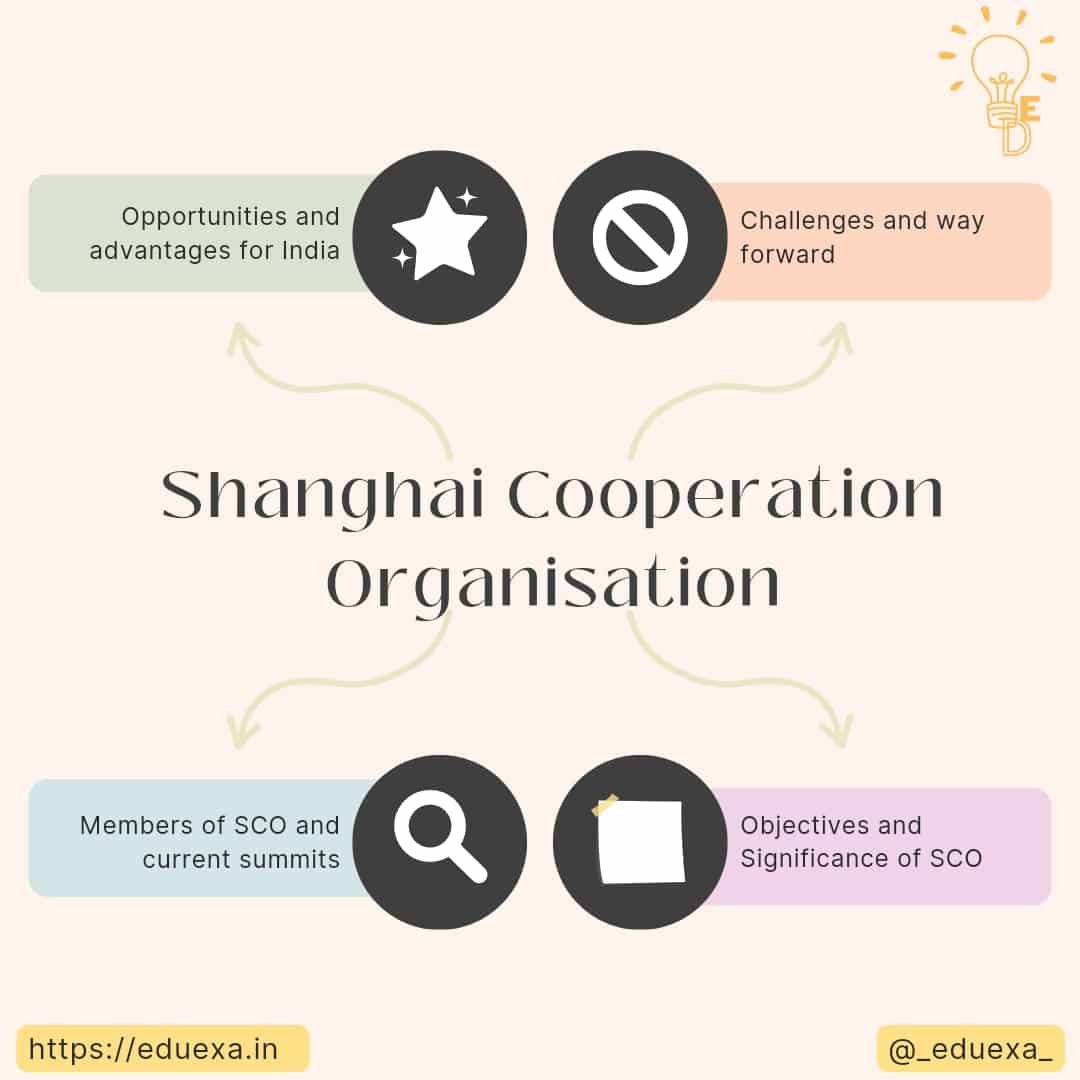All about SCO UPSC: Shanghai Cooperation Organisation
SCO(Shanghai Cooperation Organisation)
SCO Members
Presently it has 9 members – India, Pakistan, China, Russia, Iran, Kazakhstan, Kyrgyzstan, Tajikistan and Uzbekistan.
SCO Key objectives
The SCO (Shanghai Cooperation Organisation) is a permanent International intergovernmental organisation.
- To address security related concerns in the region.
- Resolving border issues.
- Military Co-operation and intelligence sharing.
- Countering terrorism.
- Cooperation in education, energy, transportation, etc.
- Strategy mutual confidence and good neighbourly relation among the member countries
- Making joint efforts to maintain and ensure peace, security and stability in the region.
Structure of SCO
The Council of Heads of States: apex decision-making body
Council of Heads of Governments: second-highest council
Two permanent bodies – the Secretariat in Beijing (China) and the Regional Anti-Terrorist Structure (RATS) in Tashkent.
Strengths of SCO
| Global population | 40% | |
| Global GDP | Nearly 20% | |
| Landmass | 22% |
Significance of SCO for India
Gain from SECURE strategy :
India would significantly gain from SECURE strategy which stands for security, economic development, connectivity, unity, respect for sovereignty and territorial integrity, and environmental protection.
Access to central Asian republic :
India can get access to Central Asian Republic to foster cooperation and improve ties as there is no other arrangement for such cooperation.
Better trade :
With better connectivity and dialogue with central asia, India can expand its products and service reach to the region. As well as it allows India to be part of an alternative economic structure in the world as sanctions by the US on Iran and Russia obstruct trade.
Energy security :
India can achieve its goal of energy security through access to oil and mineral rich central asia, Iran and Russia.
Bilateral engagements :
It will strengthen bilateral relation as it facilitates communication between India and other regional countries like China.
Promoting Regional Connectivity:
Platform to increase Indian soft power and economic cooperation through projects like Turkmenistan-Afghanistan-Pakistan-India (TAPI) Pipeline, INSTC, Chabahar Project, etc.
Promoting cooperation
Promoting cooperation in newer and contemporary aspects and improving cultural ties: India created five pillars and focus areas of cooperation under SCO- start-ups and innovation, digital inclusion, empowering youth, traditional medicine, and shared Buddhist heritage for the summit.
‘Kashi'(Varanasi) has been declared the first tourism and cultural capital of SCO.
Fostering Counter-
Terrorism Efforts: Strengthen India’s counter-terrorism efforts through intelligence sharing and institutional cooperation under RATS.
Combating illicit drug trade:
80 percent of opium and heroin supplies that originate from the Afghanistan-Pakistan region can be collectively tackled by SCO countries.
Access to Strategic Mineral Resources:
SCO can increase India’s access to critical natural resources like Uranium (Kyrgyzstan) and hydrocarbon resources.
Challenges with SCO
Bilateral issues among member states: Internal conflicts and trust deficit between member countries like India, China and Pakistan.
China’s overbearing presence in the grouping causes an imbalance in its power columns.
Anti-West Grouping: Continued perception of being an anti-west alliance creates challenges for wider global cooperation.
Projects endangering India’s National Interest: SCO’s support for China’s Belt and Road Initiative (BRI), for example CPEC which violates India’s sovereignty and territorial integrity is itself a challenge.
Structural Challenges: SCO Charter does not allow any bilateral dispute to be taken up leading to a trust deficit at the bilateral level.
Strengthening Sino-Russia Axis: Conflicts between Russia and the West have now strengthened the China-Russia axis further increasing the vulnerability of India to Chinese aggression.
Way Forward with respect to India’s role
Leveraging Multilateralism for Development: India must adopt a positive role during the SCO presidency and use the forum for the betterment of the whole of Eurasia.
Acting as facilitator: India can form a bridge between Russia and the West to restrict the decline of a rule-based order.
Regional working groups – Keeping in mind the diverse geographical membership, SCO needs to create creational working groups in order to assess regional issues and better resolve those issues.
Promoting National Interest: India can invest its diplomatic capital in evolving SCO’s agenda and progressive program to reap the benefits in its national interests.
Maintaining foreign policy autonomy: Balanced choices of strategic alliances with various regional groupings like QUAD, BRICS, SAARC, ASEAN, etc.
Constructive role: India should promote a ‘constructivist approach that can be leveraged to make the SCO a platform of agreements.
SCO UPSC Practice questions
- India has a lot more to gain from SCO membership.Comment. (150 words/10 marks)
- What is the significance of SCO? (150 words/10 marks)
- Analyse the importance and relevance of SCO for India. (150 words/10 marks)
You may also like:
Difference between UR Category and EWS Category.
Read the Places in News for UPSC Prelims.
Read a complete Guide on Black Sea Grain Initiative here.




Pingback: Battle of Plassey 1757- Important Notes for Exams | Eduexa
Pingback: History of Bengal | Regional Powers: A Comprehensive Guide
Pingback: COP 28 UPSC: A Comprehensive Guide in 2024- Eduexa
Pingback: India as Voice of Global South: Complete guide in 2024
Pingback: Important International Organisations UPSC : Complete Guide